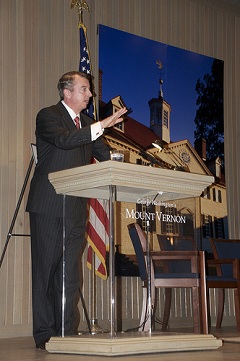 MOUNT VERNON, VA – In a speech at The Ripon Society’s 2011 Legislative Directors Symposium, former presidential advisor and Republican National Committee Chairman Ed Gillespie urged those in attendance to follow the lead of Virginia’s Governor and “finish the sentence” when talking about their party’s legislative priorities for the coming year.
MOUNT VERNON, VA – In a speech at The Ripon Society’s 2011 Legislative Directors Symposium, former presidential advisor and Republican National Committee Chairman Ed Gillespie urged those in attendance to follow the lead of Virginia’s Governor and “finish the sentence” when talking about their party’s legislative priorities for the coming year.
“Bob McDonnell was such a good candidate for governor because he would finish the sentence,” stated Gillespie, who also served as Chairman of McDonnell’s 2009 campaign. “Too often on the Republican side, we’re talking amongst ourselves. We say we just want to cut taxes, and we assume that everyone knows why we want to cut taxes. We want to cut spending, and we assume [voters] know why we want to cut spending. We have to finish the sentence.
“We want to cut taxes because we know that if people have more money to invest in the private sector economy, that will create jobs. If they have more money to spend on themselves and their family, it will be more efficiently spent. We want to cut spending because at a time when American families are tightening their belts, we need to tighten the belt in Washington, DC. And too much government spending — too much intervention in the economy — is a drag on job creation. It kills jobs.
“Too often on the Republican side, we’re talking amongst ourselves. We say we just want to cut taxes, and we assume that everyone knows why we want to cut taxes … We have to finish the sentence.”
“How we go about talking about reducing spending and lowering the burden of taxes, cutting back regulations, making sure we do what needs to be done to repeal or replace the health care bill, is critically important. And it will have a big impact on whether or not in 2012 we’re able to build on the gains we saw in this election year.”
In his remarks, Gillespie also pointed to another issue where Republicans needed to do a better job of connecting policy to people’s lives – immigration.
“We favor welcoming legal immigrants into this country and believe it’s a good thing,” he said. “But sometimes that policy gets lost because we’re so busy talking about keeping illegal immigrants out.
“The fact is, people who come to this country legally contribute to our society, contribute to our economy, and contribute to our culture. We have not only a right, but an obligation to secure our borders. But we also have to welcome people into our country and into our party, I would argue, as a Republican. I say that not based on any theory. I know this to be a fact.
“My father was an Irish immigrant. He came here from Ireland at the age of 9, was processed through Ellis Island, grew up in North Philadelphia in some pretty tough neighborhoods, worked as a janitor. He fought for his adopted country in World War II, won two Purple Hearts, a Bronze Star, a Silver Star, was a small business owner. He and my mother had a mom-and-pop grocery store, and he lived every Irishman’s dream — he bought his own bar. He’s a great American. We need to send a signal that we recognize and welcome these folks.”
We have not only a right, but an obligation to secure our borders. But we also have to welcome people into our country and into our party, I would argue, as a Republican.
Gillespie, who currently heads up Resurgent Republic, a policy research group that closely tracks independent voters, stated that sending this kind of signal on immigration is not just the right thing to do, but is smart politically, as well.
“If the Republican nominee in 2020,” he said, “gets the same percentage of the Hispanic vote and the African American vote and the Asian American Pacific Islander vote as John McCain got in 2008, the Republican nominee will lose by 14 percentage points. We’ll be in a situation where Florida won’t be a swing state — Texas will be a swing state. And that’s a tough row to hoe in the Electoral College. So I counsel that there’s one warning out there for us that might be masked by the massive gains we made in the last election. And that is the demographic challenges before us — if we’re not thoughtful as a party and we’re not thoughtful as we talk about policies — will be a real long-term challenge for us as well.
“But in the immediate term we are very fortunate to be in a position where we are where the majority of Americans are in our policies and in our approach to government. We are where they are when it comes to the debt and spending and government intervention in the economy. I think that most Americans understand they are better off to have strong national security, and that apology tours are not going to make us safer as a country and are not going to make the world more stable.
“So we have a real opportunity here to build on the majorities that we have gained, including adding to the House majority with a Senate majority in 2012 — which I think is very likely — as well as winning back control of the White House.”




